Croatia's Liberalized Travel System Hits Bureaucratic Speed Bump
April 9, 2020 — Vera Blažek from Cakovec biked five kilometers to a supermarket yesterday afternoon, preempting pensioners and the crowds that come with them. The 68-year-old technically broke the law.
It takes about half an hour to get around the bike path. But reach the Čakovec shop from her Čakovec address, she needs an "e-pass,” she told Jutarnji List. The Municipality of Šenkovec dips into Čakovec a few kilometers along the main road. The bizarre shape and lack of continuity has made Croatia’s e-pass system a confounding mess for local authorities wanting to grant some mobility to citizens, while still preventing the virus’s spread.
Croatia’s multi-tiered municipal and county governments are clashing over loosening restrictions on the movement of healthy residents via the e-pass system. The government has issued 700,000 such passes to residents claiming a need to leave their neighborhood.
Some local authorities want free movement, others fear undoing keep the current system’s effectiveness against the coronavirus. The countries convoluted delegation of government duties doesn’t help.
Oddly shaped municipalities and cities overlap and puncture each other at odd angles. Stand on one street corner, and the opposite side may follow a different bureaucratic regime. Crossing any of these haphazard borders requires a legal document. Which makes Blažek’s casual trip to the supermarket, technically, illegal.
No one thought about the territorial borders, nor did they seem important until the emergence of coronavirus spurred travel restrictions. Now a trip to buy provisions requires a government pass.
“Well, I don't need a pass to go to Čakovec,” Blažek told the paper. “I’m from Cakovec.”
Josip Zerjav has a pass to get to work in Varaždin County — a 15-minute trip through several commuter municipalities. “My pass is worth the exact route,” he said. His grandparents live two kilometers off the route. “I need a pass to get to them,” Zerjav said. “That doesn't make sense.” Not that authorities are enforcing the rules.
Police officers monitor the entry points to Međimurje County, but not the municipalities which make it up. The government has yet to approve the Međimurje County’s proposal combining its constituent Civil Protection Directorates, turning all of its smaller parts into one large, pass-free zone. But Međimurje and police officers are tacitly already implementing it.
The National Civil Protection Directorate hasn’t approved territorial mergers of local civil protection authorities, other than in Istria. Several local leaders are backing away from the idea, worried it’ll undo Croatia’s carefully executed and, so far, successful nationwide lockdown.
The leaders of several local civil protection directorates have refused mergers, worried large numbers of people will come into their territory overnight and, potentially, expand the epidemic.
The effects of the loosening restrictions are already showing. More residents and cars are on the streets. Long lines now form in front of shops, some ignoring the mandated social-distancing rules.
The city of Duga Resa, for example, has a population of 12,000 and covers an area of 58 square kilometers. If the proposal to "merge" four neighboring municipalities - Bosiljevo, Barilovic, Generalski Stol and Netretic - were adopted, the number of residents traveling without e-passes would increase by about 10 thousand, while the free-travel area would increase to about 500 square miles.
Interestingly, many "agricultural counties" do not want the liberalization of the e-Pass regime. The Vukovar-Srijem, Požega-Slavonia and Virovitica-Podravina counties, for example, will not submit proposals for enlargement to the National Headquarters. The same is true in Varaždin County.
"When the national headquarters, based on current figures, conclude that the time has come for the loosening, we will certainly support it," Varaždin County Civilian Protection Chief of Staff Robert Vugrin told Jutarnji.
He also believes that with such decisions, one must also take responsibility if the plans backfire: the large number of people traveling will make the virus will spread faster.
“I understand that there are specific spaces, but it should then be clearly defined which and why exactly. Because like this, with more and more requests, this is no more an exception than a rule,” said Vugrin, noting that he does not like the current situation because it 'creates a mess'.
In that county, they believe the current model of e-passes needs work. Among other things, pass holders do not specify their route, which loses control over the movement of residents once inside another city’s borders.
The City of Varazdin wants to merge the city area with 10 neighboring municipalities, even though Varazdin County opposes the rule.
The mayor of Varaždin, Ivan Čehok, on his FB profile, commented on the city proposal, but also on those who consider it dangerous, including Vugrin in Varaždin County.
“I have seen counterarguments, however: we do not encourage this to travel anymore, it is an area of otherwise daily migration,” Čehok wrote.
The debate has yet to reach a head, and with many mayors and county heads balking at the chance to unite, e-Passes may continue to be in high demand.
President Milanović Pays Tribute to Police Officer Josip Jović
ZAGREB, March 31, 2020 - President and Armed Forces Supreme Commander Zoran Milanović on Tuesday lit a candle at a monument at Plitvička Jezera commemorating Josip Jović, the first Croatian police officer killed in the Homeland War, on the occasion of the 29th anniversary of his death.
Milanović's envoy, Brigadier Darko Podrug, head of the Croatian Navy commander's office, laid a wreath at Jović's grave in Arzano.
Jović, 22, was killed and nine other police officers were wounded in a police operation on 31 March 1991 after Serb insurgents occupied the Plitvice Lakes National Park and blocked the D1 state road that connects the country's north and south.
Jović was a member of the Lučko Anti-Terrorist Unit.
Minister of the Interior Davor Božinović on Tuesday paid tribute to Josip Jović, the first Croatian police officer killed in the Homeland War, as well as to other police officers and soldiers killed in the 1991-95 war.
Božinović lit a candle at a monument commemorating Jovic at Plitvice Lakes on the occasion of the 29th anniversary of his death.
Božinović, who heads the national team managing the current coronavirus crisis, said that police, together with other services, were today on the first line of defence against coronavirus, just as they had been on the first line of defence during the war.
More news about the Homeland War can be found in the Politics section.
Police Union Calls on Government to Dismiss Demands for Public Sector Wage Cuts
ZAGREB, March 21, 2020 - The SPH police union on Saturday called on the government and Ministry of the Interior to dismiss demands for public sector wage cuts amid the coronavirus epidemic, which, it said, are being made by "certain irresponsible politicians."
"At a time when some of the public sector employees, including health workers and police, are facing the most difficult period in their career, demands for cutting their wages only cause unease among them," the union says.
Police officers, who are normally faced with various risks in their work, have accepted the additional risk of infection and will carry out all tasks to be assigned to them in the coming days but they do not deserve "calls by certain politicians... for a reduction of their wages," the union said, calling on the government to dismiss such demands.
More coronavirus news can be found in the Lifestyle section.
Croatian Police to Help Guard Greek-Turkish Land Border
ZAGREB, March 11, 2020 - Croatian police will be deployed at the Greek-Turkish border as of Wednesday as part of an operation conducted by the European Border and Coast Guard Agency, known as Frontex, the Ministry of the Interior said in a statement on Tuesday.
Four Croatian police officers were sent to Greece on Tuesday to help guard the Greek-Turkish land border as part of Frontex's Rapid Border Intervention 2020 mission.
The operation is being launched on Greece's request and in accordance with the European Border and Coast Guard regulation. It starts on 11 March and ends on 6 May this year, and will involve a total of 100 police officers from EU member states.
The Croatian police will stay in Greece until 8 April when they will be replaced by another contingent who will stay in the country until the end of the operation in May. There is a possibility of the operation being extended and the contingent enlarged, the statement said.
Greece is facing an influx of migrants from Turkey after Ankara announced on 29 February that it was opening its borders towards the European Union. Turkey has taken in nearly four million people displaced by the Syrian war.
More news about the migrant crisis can be found in the Politics section.
Police Arrest Man Who Smashed Windows on Clinic Out of Hatred for Freemasons
ZAGREB, March 4, 2020 - Police said on Wednesday that they had identified the perpetrator who had recently smashed windows on the Zagreb eye clinic owned by ophthalmologist Nikica Gabrić, who attracted public attention by confessing that he is a member of Freemasons.
A 37-year-old man was identified and taken into police custody on the suspicion that he had damaged the clinic on 24 February following media reports about Gabrić's membership in a Freemason lodge.
Gabrić has been in the limelight since his recent public dispute with former Chief State Prosecutor Dražen Jelenić, which revealed that both men are Freemasons.
Jelenić resigned on 19 February, after he himself confirmed that he is a Freemason and accused Dr Gabrić of having tried to influence a preliminary investigation into three reporters who allegedly blackmailed the ophthalmologist demanding that he give them HRK 200,000 or they would publish photographs of a ceremony of the Masonic lodge to which Gabrić belongs. As soon as Jelenić made that statement, Gabrić dismissed it as false.
More news can be found in the dedicated section.
Croatia Border Patrol Tracking Migrants With Portable Thermal Imaging
During the 2015 migrant crisis, Hungary and Slovenia built border barriers to thwart the influx of illegal migrants. Until recently, Croatia border guards have faced the daunting task of manually monitoring their unfenced 1,326 km border, which is also a non-Schengen EU border. However, with the help of advanced thermal imaging technology, Croatian border guards have finally gained an edge on stopping illegal migrant movement.
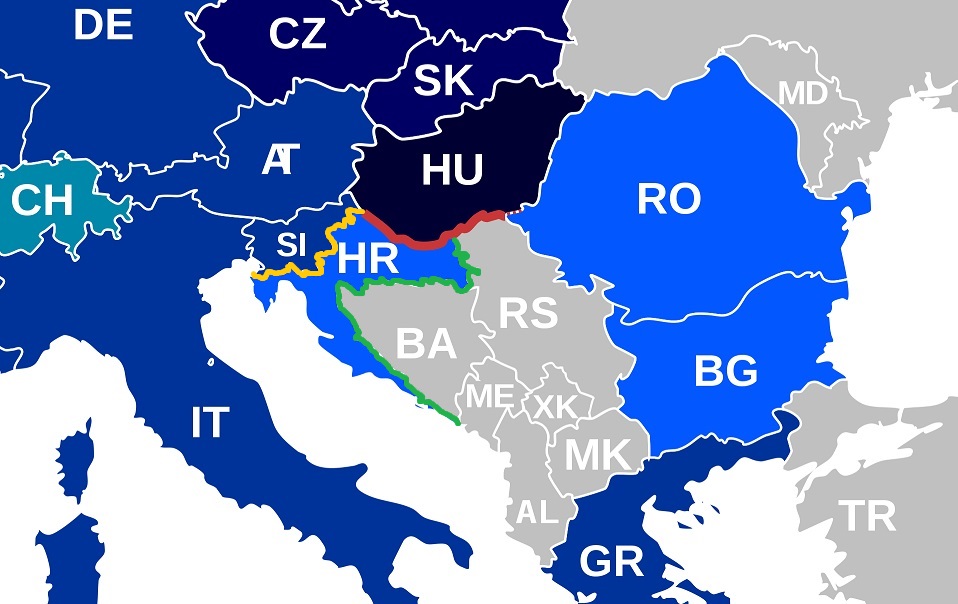
Hungary Border Fence (Red) | Slovenia Border Fence (Gold) | Croatia Border No Fence (Green) | Wikipedia
Unfenced Croatia EU Border 1,326 Kilometers Long
The Hungarian border barrier, which spans the borders of Serbia and Croatia, is 523 km long. The Slovenian border with Croatia spans 670 km. By contrast, Croatia shares a combined 1,326 km unfenced border with Bosnia and Serbia (1009 km with Bosnia, 317 km with Serbia). And migrants, many of whom are biding their time in nearby border camps, make repeated and daily attempts to enter Croatia from both countries, a practice which they call "The Game".
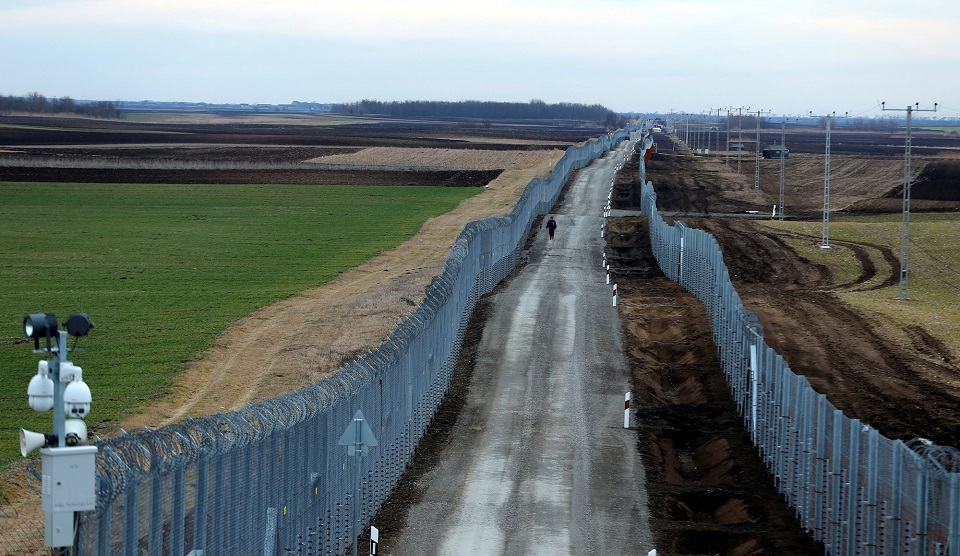
Hungary Border Fence | Wikimedia Commons
Electrified Hungarian Border Barrier Stopped Illegal Migration
Once completed in 2015, the Hungarian border barrier effectively halted migration into that country. It is equipped with parallel barbed-wire fences, floodlights, security cameras, and loudspeakers which blare warnings in English, Arabic and Farsi. The fences also deliver a mild electric shock upon contact, and have rendered any potential accusations of migrant pushbacks a moot point.
The Slovenian border barrier, while not as advanced, has also deterred attempts by migrants to enter Croatia’s Northwest neighbor. Both fences have effectively left many migrants, who are seeking entry into the Schengen zone, stranded in Croatia. While trapped in Croatia, they work with smugglers or attempt to continue their journey to Italy, Germany and France on their own.
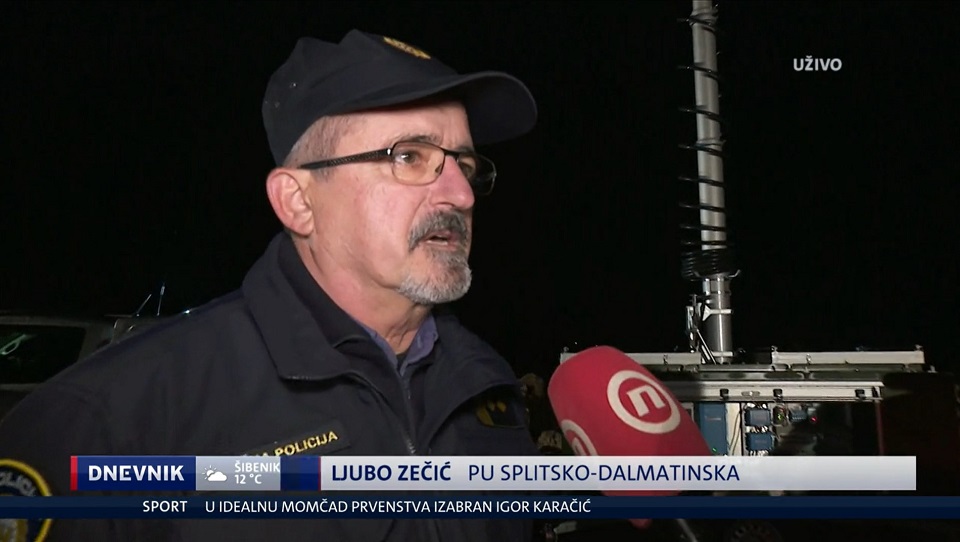
Croatia Begins Using Mobile Thermal Imaging Cameras
The Croatian border is now being protected by mobile thermal imaging cameras which can detect people illegally trying to enter Croatia from up to distance of several kilometers. The Nova TV/Dnevnik news team went to the border on January 26, 2020 and was the first to see how the 6 million EUR system works in practice.
Croatian police departments located on the illegal migrant route and roads leading to Croatia have been equipped with 17 Flir mobile camera systems.
Ljubo Zečić of the Splitsko Dalmatinska County Police Administration said that there are two devices are in their jurisdiction and indicated that it is very helpful that the system is mobile and can be easily transferred to positions which have been detected as frequent crossings.
Most Migrants Enter Croatia From Sarajevo and Mostar
"Most migrants coming from Bosnia are attempting to enter Splitsko Dalmatinska County from Sarajevo and Mostar. In 2019, our police department reported a 30 percent increase in illegal migrants and a 54 percent increase in smugglers," Zečić said.
Tomislav Poljak from the Trilj station demonstates the Flir thermal imaging device, which has already thwarted the plans of numerous migrants and smugglers to enter Croatia illegally.
"Our colleagues are walking about two and a half kilometers from us, and we can detect exactly what is happening at that distance with this device," explains Poljak.
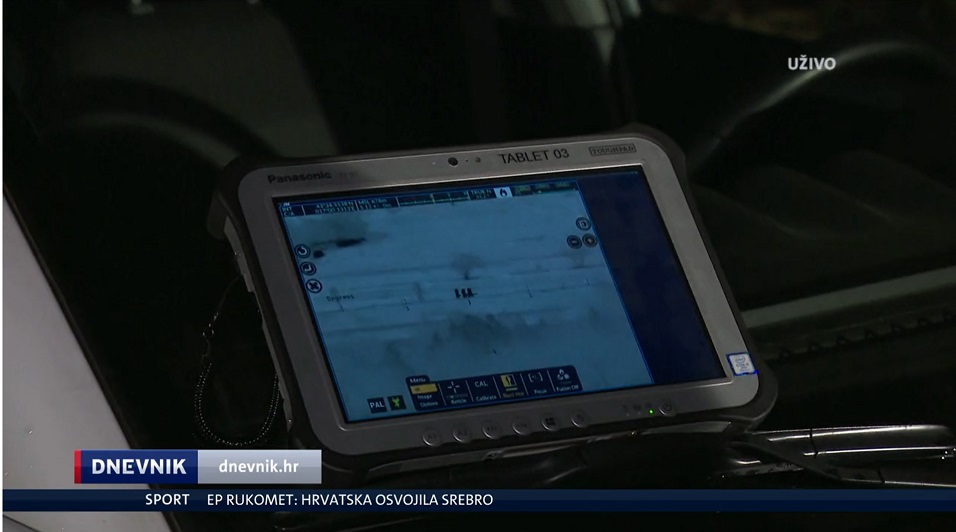
Migrant Cell Phones Permit Communication and Coordination
As soon as Tomislav's work shift began, he noticed some suspicious activity on the border. It was likely that someone was attempting to enter Croatia on a gravel road, which is often used by migrants going to Sinj. The nearest border control team was immediately dispatched to the field.
"A lot of migrants have very good cell phones and are quite well informed. And nowadays, they use temporary sim cards with these cell phones. They always have another trick up their sleeves,” Tomislav points out.
Cameras Detect Migrant Movement Across Bosnia Border
Almost a kilometer above sea level, the police officers found an abandoned truck which migrants often us to seek shelter from bad weather. Since there was no one in the truck, the Trilj border guards continued their search with manual thermal imaging devices.
"Without this technology, it would be much harder to do our job because you cannot see anything in the dark with human eyes," Zdenko explains.
The police action was soon abandoned because the suspect returned to Bosnia and Herzegovina.
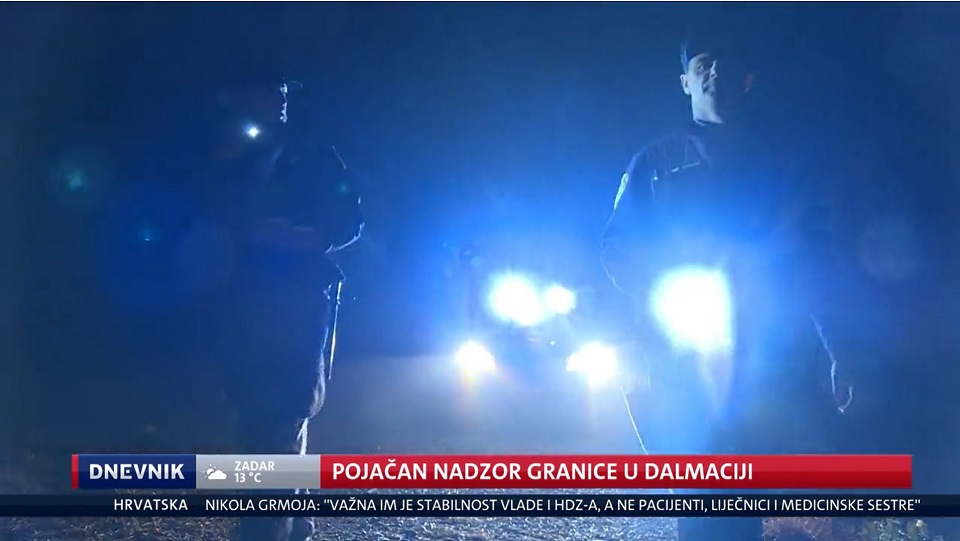
Cameras Can Be Moved Within 20 Minutes
The benefits of these devices are numerous. "If we need to move it to another location quickly, it takes us maybe 15-20 minutes to pack it up and drop it off," Tomislav says.
The cost of one Flir thermal imaging camera is almost 2.7 million HRK (362,789 EUR). If you approach it; the device automatically notifies police officers on the ground and issues a verbal warning. With the help of this technology, police believe that they will finally be able to stay a step ahead of smugglers and people trying to enter Croatia illegally.
Follow our Politics page to keep track of the migrant crisis in Croatia and efforts to control illegal border movement.
Training for Border Police Starts in Valbandon
ZAGREB, January 27, 2020 - A training course for 18 border police, including police officers from countries of the so-called Western Balkans migrant route – Albania, North Macedonia, Kosovo, Serbia, Montenegro, and Bosnia and Herzegovina, started in Valbandon on Monday.
The training is being conducted by the Croatian Ministry of the Interior Police Academy, in cooperation with the German Police Academy as a partner in the project, and with the financial and technical assistance of Frontex.
This is the first time the project includes police officers from third countries, primarily those along the Western Balkans migrant route.
"Considering that the Western Balkans route continues to be one of the most attractive migrant routes for illegal entry to the European Union, it is essential to strengthen the preparedness and capacity of all border police forces in EU member countries and non-member countries, with special focus on the protection of human rights and treatment of vulnerable groups," Zagreb Police Academy assistant director Mirjana Abramović said.
She added that the Valbandon practical training course would introduce its 18 participants to European legislation and procedures and ways of protecting the European Union's external border.
The training is based on practical exercises and training sessions, to be conducted by experts for border supervision and human rights protection.
"As of tomorrow, they will work together in teams and go out into the field. The scenarios have been prepared and after each case they will have to prepare an operative report in accordance with Frontex procedures," Abramović underscored and added that the project was strengthening the Interior Ministry's educational role in the region while the Police Academy was strengthening its international relations with partners in the region, particularly German federal police.
More news about the migrant crisis can be found in the Politics section.
Ministry of Interior to Spend 5.9 Billion Kuna in 2020
ZAGREB, January 22, 2020 - The Ministry of the Interior on Wednesday presented its financial plan for this year, worth 5.9 billion kuna, and signed about 30 contracts with domestic companies which will deliver their products to police and civil protection forces this year.
The financial plan is 228.3 million kuna or 4% higher than last year, it was said at the presentation.
The increase refers mostly to salary expenditures, funds for Croatia's EU presidency and the procurement of police equipment.
Assistant Minister Cvjetko Obradović warned about a decrease in the share of salary expenditures in the ministry budget.
"Salaries accounted for as much as 76% of the ministry budget in the previous period, last year they accounted for 66.13% and this year they are expected to account for 65.69%," he said.
Obradović said that the ministry's priorities included raising the quality of accommodation for police officers, energy renovation of buildings used by police and raising the quality of police work.
1.6 billion kuna of the 2020 ministry budget is intended for public procurement, mostly of equipment for police and civil protection units, mine removal and road safety.
Minister of the Interior Davor Božinović signed contracts with some 30 domestic companies for the procurement of equipment for police and civil protection units, equipment for EU presidency, equipment envisaged by EU projects, and mine removal. The total value of the contracts exceeds 289 million kuna.
More news about Interior Ministry can be found in the Politics section.
Turkish Smuggler Crashes Migrant Van into Croatia Police Vehicle
Police officers from the Zagreb Police Department are conducting a criminal investigation involving a 34-year-old Turkish national, who attempted to smuggle 15 migrants, after he disobeyed police orders, hit a police vehicle with his van and attempted to flee.
The suspect has been detained on charges of committing the criminal offenses of "Illegal entry, movement and stay in the Republic of Croatia, another EU Member State or signatories to the Schengen Agreement", "Coercion against an official" and "Damage to someone else's property," according to Laura Vuckovic/Zagreb Info on December 28, 2019.
On Tuesday, December 24, 2019 at 12:45am, police officers stopped an Iveco Daily van with German license plates, which was driven by a 34-year-old Turkish national, at the Sveta Helena rest stop on the A4 Zagreb – Goričan motorway. Upon inspection, the officers discovered 15 asylum seekers in the cargo area of the van.
Turkish National Loaded Van in Zagreb
A criminal investigation has confirmed that the suspect, a Turkish national, placed the 15 asylum seekers in the cargo area of a van on December 24, at an undetermined location in Zagreb, with the intention of acquiring undue financial gain. While driving on the A4 Zagreb - Goričan motorway, he was spotted and stopped by police officers at a gas station, and the police officer identified himself to the driver with a badge and ID.
Although the police officer was standing next to the driver's door, the suspect disobeyed his order to turn off and exit the vehicle. Then, he attempted to flee by driving away and struck the front door of the police vehicle with his van. After about 15 meters, police officers prevented him from going any further and escaping.
After the initial criminal investigation was completed, the suspect was handed over to the detention supervisor, and a criminal complaint was filed with the State Attorney's Office on suspicion of committing the above-mentioned criminal offenses.
Almost 1000 Migrant Smugglers Arrested in Croatia
As of December 27, 2019; 976 migrant smugglers have been arrested in Croatia and charged with 904 crimes. As of the same date; 1,661 people have also applied for international protection in Croatia. In more than 70 percent of those cases, the procedure for granting international protection has been suspended because the applicants have arbitrarily left the official asylum seekers' shelter, which suggests a systematic abuse of the Procedure for International Protection.
In this scenario, asylum seekers, after being discovered while attempting cross the state border illegally into Croatia, most often within Lika-Senj Police District, express a false intention to seek international protection in Croatia after they have been detained. Then they use smuggling networks to continue their journey to their destination countries (Austria, Germany, Italy).
According to Zagreb Police, these scenarios are referred to as “secondary migrations” because they are comprised of exclusively economic migrants. These migrants do not appear to show any evidence of persecution in their country of origin, nor in the countries they are attempting to enter Croatia from (Bosnia, Serbia).
TCN reported another crash earlier this year which involved a Serbian national driving a van filled with 33 migrants, who crashed into a roadblock while attempting to flee police.
Follow our Politics page for coverage on the migrant crisis in Croatia.
Police Say Attack on Two Americans in Zadar Wasn't a Hate Crime
ZAGREB, December 22, 2019 - Zadar police said on Saturday a criminal investigation of a physical assault on two US citizens in a night club in the coastal town showed the crime was not motivated by hate.
The police investigated two Croatian citizens aged 19 and 33 on suspicion that, in the early hours of October 20, they physically assaulted two US citizens aged 24 and 25, lightly injuring one, while the other refused medical assistance.
After the criminal investigation, a misdemeanour report has been filed against the two Croatians for disturbing the peace.
The investigation conducted so far shows the assault was not motivated by hate, police said, adding that the criminal investigation is continuing.
The two US citizens were African American soldiers and, the media reported in October, they were in Zadar on vacation and allegedly openly showed they were gay. The US Embassy in Zagreb condemned the attack, saying the well-being and security of US citizens abroad was one of the State Department's priorities.
More Zadar news can be found in the Lifestyle section.


